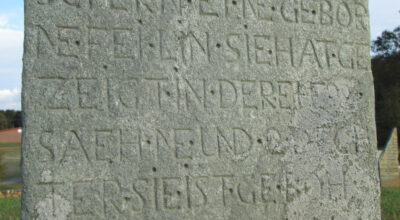Remembering summers at Lutheridge
Published 12:00 am Monday, June 23, 2014
During the summers of 1968 and 1969, I spent a week each in Arden, N.C., at Lutheridge. Over time, the events of those two weeks have become melded together.
Googling: “Lutheridge,” the overall heading “Novus Way” appears. (Nothing is called the same anymore; and in that respect, “Novus” is reminiscent of “Novant.”)
Other Protestant denominations have their summer retreats in the region: the Baptists at Ridgecrest, the Presbyterians at Montreat, and the Methodists at Lake Junaluska.
This convergence of faith upon “higher ground” was predated by, and in a way reminds me of some of the early Native-Americans’ choice of barren, rocky outcrops in the mountains known as “balds” and “domes” for religious ritual.
En-route, I saw the same types of folded, metamorphic rock in the road cuts as those seen in Watauga County on childhood trips to Tweetsie, both sets of “folds” just part of that great “road” extending North and South: The Appalachian Mountain Range.
We settled into “Leadership Hall,” basically a dormitory, and slept with the windows open, no need for air conditioning.
My first morning there, I was awakened by the instrumental strains of J.S. Bach’s “Sheep May Safely Graze.” For such a gentle tune, instead of “awakened,” I should more properly say: “My mind was delicately drawn back from the unconscious world to its conscious counterpart.”
I saw a loudspeaker in a tree, but even so, I would have thought it perfectly natural there for the leaves to exude Bach, just as they do oxygen.
Our counselor was Pastor Harvey Blume of Saint Mark’s Lutheran, China Grove. One day, he took us to Asheville to see the D-Day movie, “The Longest Day.” When Gen. Gunther Blumentritt appeared in the film, I jokingly asked Pastor Blume if he was a relation, and he said, “Probably.”
History relates that Blumentritt was a “good man,” so if Pastor Blume were related to him, there would be no shame; and if so related, then “good men” evidently run in the family.
One night, coming back from sitting and singing on the dock at Lutheridge’s Lake Lewthorne (named for the Rev. Lewis Thornburg D.D.), Pastor Blume was with us and there was the brightest full moon overhead. I don’t know if it originated with one person, or if it was “group inspiration,” but we all started singing: “Shine on, shine on Harvey Blume, up in the sky!”
One day, we took an exhausting hike, then made a bonfire for roasting hot dogs. I remember being so tired that I said: “Throw me on as fuel too,” but fortunately, no one took me up on it.
Lutheridge’s dining hall was especially memorable for their peanut butter-and-honey sandwiches. (Of course, they served other things too.)
My mother sent me several letters, including clippings from the Post to keep me up to date. She used a particular sort of self-stick envelope, the adhesive of which resembled sticky strands of mozzarella.
I remember someone playing the recently released album of the musical “Hair,” and I associate the song “Let the Sun Shine In” with Lutheridge.
We had crafts, and I made a wood-burned, Maltese cross. (Reading this, those of you with me at Granite Quarry and East Rowan are probably saying: ”So what else is new?”)
One evening , we saw something a little disturbing. A male and female chaperone (not Lutheridge staff), married to others, were embracing and kissing at the top of a flight of stairs. Seeing us, they seemed startled and stated that theirs was a “special relationship.” But instead of something “special,” it looked like the “usual” sort of thing to us. I reiterate that they were not Lutheridge staff, and I only mention it because it happened.
Everyone there will always remember a tragedy. One of the pastor’s teenaged sons got out of the swimming pool and picked up an ungrounded, live microphone. He may have been just about to say some happy words of the moment, or sing one of those good old late 1960s songs, but pretty much died instantly. I didn’t see it happen and only observed the crowd and emergency vehicle afterwards.
In that time of faith, joy of life, friendship and love (for some), death reminded us that it was also no respecter of topography, reaching up into that “Land of the Sky.”


